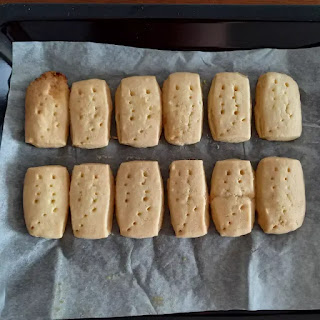Since I bought it last year, the tabletop oven has seen little use outside of warming up food and a batch of shortbread I baked as a test run. This year though, it's been used to bake fish, another batch of shortbread, and a couple of chicken meals.
The first was four (small) drumsticks on a bed of onion, carrot, and potato, with cloves of garlic scattered here and there. Marinade was salt, pepper, onion powder and garlic powder. I was worried that I oversalted the chicken, but didn't turn out that way.
I didn't keep track of the time because I only eyed the condition of the chicken skin for doneness. At one point, I could see juices bubbling under the translucent skin. I turned the pieces to the other side when one side was nice and light brown.
All went down the hatch, with two pieces of wrap skin that served as flat bread. I was quite pleased with this, even though the onion and garlic powders clumped into a gel-like substance that didn't spread well.
Encouraged by this, I attempted another weeks later before New Year's Eve 2023. Two boneless chicken thighs marinated in a yoghurt-based marinade with turmeric, cayenne pepper, salt, garlic powder, onion powder, cinnamon and nutmeg – a chicken tikka-ish mix – with onions, carrots and potatoes. Plus a load of garlic cloves.
I tend to overcook things in the oven due to paranoia – what if the inside is underdone? And does the marinade need to be wiped off the chicken? Did I use too much salt? Too much turmeric? Can I still use the cooking oil, even though its best-by date was last April? So many questions.
Several potato bits seemed underdone but the rest of the dish tasted okay. This needs practice, though I shudder to imagine how much meat I'd have to go through to get things right. And I think I'll have to junk the rest of the cooking oil. I rarely use it, and though it didn't taste "off", playing it safe is prudent.
What caught my eye about the chicken was – yes – that claim about it being raised on yoga music. The logic being that animals raised in a calming atmosphere are less prone to stress and therefore healthier and yummier. I spotted
this type of chicken when I went to check out a frozen-goods shop that also sold fresh chicken in the old OUG neighbourhood.
If "yoga music" is the sort I had listened to in my few yoga lessons, I~ don't think that's how one should use those tunes. Imagine a coop full of chickens taking yoga lessons with Yoga Music™ in the background one day, and then the next ...
I feel sinful eating that chicken. Should I say "namaste" instead of "itadakimasu"? And is it ethical to use yoga music in that setting? What would the composers and songwriters feel about that?
Anyway, the store that sells this yoga chicken also has buffalo meat, which would make a great stew experiment. I've heard things about buffalo meat that made me curious to see if it could be as good as beef. Too bad the meat only comes in one packaging size. How can one tuck in 500g of buffalo meat plus extras in one sitting?
We'll see. The year has just begun.


